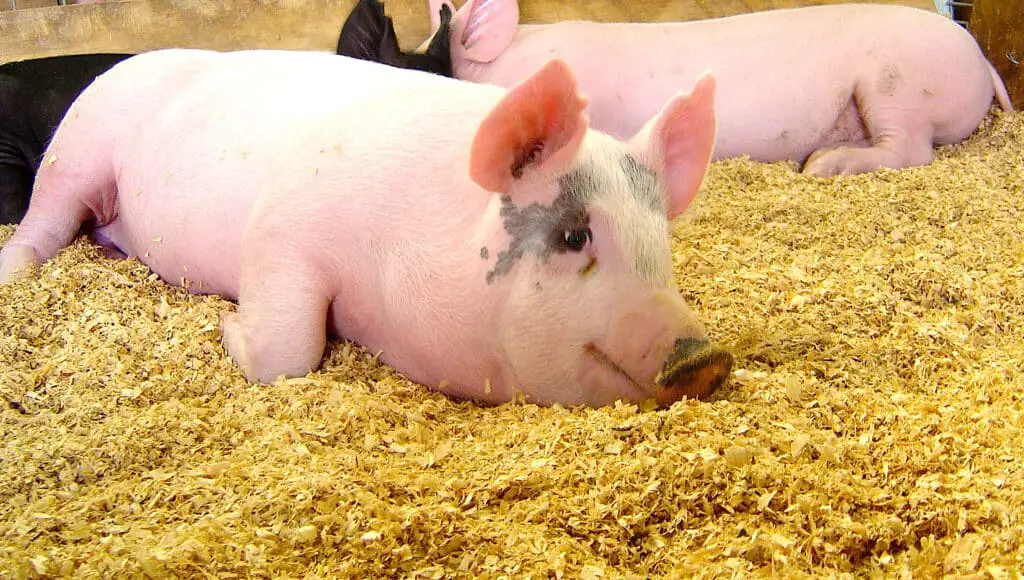Introduction
What Do Pigs Represent: Pigs hold a unique and multifaceted symbolism in various cultures and contexts around the world. These intelligent and versatile animals have been a part of human history for thousands of years, and as such, they carry a rich tapestry of symbolism and meaning.
Delve into what pigs represent in different cultural, religious, and literary contexts. From their association with wealth and prosperity in some societies to their symbolic role in religious rituals and folklore, pigs have left an indelible mark on human culture.
We will examine how pigs are depicted in literature, art, and popular culture, where they often serve as metaphors or symbols for various human traits and behaviors. Whether as symbols of abundance and gluttony or as representations of filth and impurity, pigs have a diverse and nuanced presence in our collective consciousness.

What are pigs a symbol of?
Pig names are used as epithets for negative human attributes, especially greed, gluttony, and uncleanliness, and these ascribed attributes have often led to critical comparisons between pigs and humans.
Prosperity and Abundance: In various cultures, pigs symbolize prosperity, wealth, and abundance. Their association with fertility and the ability to produce many offspring has led to their representation as a symbol of financial success and good fortune.
Gluttony and Excess: Pigs are also symbolic of gluttony and excess due to their voracious appetite and tendency to overindulge. In some contexts, they represent the negative consequences of overconsumption and lack of self-control.
Intelligence and Cleverness: Pigs are highly intelligent animals, and their symbolism often includes qualities like intelligence, cleverness, and resourcefulness. In literature and folklore, pigs are portrayed as cunning and capable of outsmarting others.
Transformation and Change: The pig’s life cycle, from piglet to adult, symbolizes transformation and growth. In some belief systems, pigs represent the idea of evolving and changing over time.
Pigs are sometimes associated with filth and impurity due to their habit of rolling in mud. In this context, they symbolize uncleanliness or moral impurity.
Sacrifice and Ritual:
Pigs have played a significant role in sacrificial rituals in various cultures. They symbolize offerings to deities or spirits and are believed to bring blessings or appease supernatural forces.
Stubbornness and Persistence: In some stories and proverbs, pigs symbolize stubbornness and persistence. Their determination to achieve their goals, even when faced with obstacles, is highlighted.
What do pigs represent negatively?
Pigs are often associated with negative labels such as ‘filthy’, ‘lazy’ and ‘greedy.
Filth and Impurity: One of the most common negative associations with pigs is their perceived filthiness. Pigs are known to roll in mud to regulate their body temperature and protect themselves from insects. This behavior has led to the view of pigs as unclean animals in various cultures.
Gluttony and Excess: Pigs are often used as symbols of gluttony and excess due to their voracious appetite and tendency to overeat. In this context, they represent the negative consequences of overindulgence and a lack of self-control.
Laziness and Sloth: In some cultural interpretations, pigs are associated with laziness and sloth because of their leisurely and sedentary lifestyle. This negative stereotype highlights a lack of industry or ambition.
Stubbornness and Abstinence: Pigs can also symbolize stubbornness and obstinance in certain contexts. Their determination to root and forage, even when faced with obstacles, has led to their portrayal as unyielding or uncooperative animals.
Impulsiveness and Lack of Planning: Pigs are sometimes used to symbolize impulsiveness and a lack of foresight because of their tendency to act on instinct rather than careful planning.
Lack of Refinement: Pigs are occasionally associated with a lack of refinement or refinement in taste due to their simple and straightforward dietary preferences.
Why are pigs considered lucky?
Pigs are a popular symbol of good luck. The origins of this belief can be found in the Middle Ages, when the animals were considered a sign of prosperity. Not only were pigs omnivores and therefore relatively easy to feed with scraps, but they also reproduced very quickly, giving their owners a constant food resource.
Symbol of Prosperity: In many cultures, pigs are considered lucky because they symbolize prosperity and wealth. Their ability to reproduce quickly and have many piglets in a single litter signifies abundance and financial success.
Fertility and Growth: Pigs are associated with fertility and growth due to their prolific breeding. Their symbolism is often linked to the idea of continuous growth and the abundance of resources.
Connection to Agriculture: Pigs have historically played a vital role in agriculture, helping people till the land and providing a source of meat. Their importance in farming communities has contributed to the belief in their luck-bringing qualities.
New Year’s Tradition: In some cultures, pork or pig-shaped items are traditionally consumed or displayed during New Year’s celebrations. This is believed to usher in good luck and positive energy for the coming year.
Good Fortune in Chinese Culture: In Chinese culture, the pig is one of the twelve zodiac animals and is associated with good fortune, honesty, and sincerity. People born in the Year of the Pig are believed to have a lucky and auspicious destiny.
Cultural Beliefs: The perception of pigs as lucky animals is rooted in cultural beliefs and traditions, passed down through generations. These beliefs emphasize the positive qualities and symbolism associated with pigs.
What does God say about pigs?
And the pig, though it has a split hoof completely divided, does not chew the cud; it is unclean for you. You must not eat their meat or touch their carcasses; they are unclean for you. “Of all the creatures living in the water of the seas and the streams, you may eat any that have fins and scales.
In Abrahamic Religions: In Abrahamic religions like Judaism, Christianity, and Islam, the view of pigs is generally negative. In the Bible’s Old Testament, for example, pigs are considered unclean animals and are prohibited from consumption under Jewish dietary laws (Kashrut). Leviticus 11:7-8 states, “And the swine, though he divide the hoof, and be cloven footed, yet he cheweth not the cud; he is unclean to you.”
Islamic Perspective: Similarly, in Islam, pigs are considered unclean (haram), and their consumption is strictly forbidden under Islamic dietary laws (Halal). The Quran mentions the prohibition of pork consumption in several verses, including Surah Al-Baqarah (2:173) and Surah Al-An’am (6:145).
Other Religious Perspectives: In some indigenous and pagan religions, pigs are revered and considered sacred animals. For example, in Hinduism, the boar is associated with the god Vishnu and is considered a sacred animal. In some African and Native American traditions, pigs are seen as symbols of abundance and are used in religious rituals.
Interpretation and Cultural Variation: The interpretation of what God or religious texts say about pigs can vary widely across different religious denominations and cultural contexts. While some religions prohibit pork consumption and consider pigs unclean, others have more positive or neutral views of these animals, reflecting the diversity of human beliefs and practices.
What does the pig symbolize in art?
Small images of pigs—a symbol of wealth in ancient China—sculpted in jade or soapstone, were often placed in the hands of the deceased to express the wish for wealth in the afterlife.
Abundance and Prosperity: In various forms of art, the pig is often used as a symbol of abundance and prosperity. Its association with fertility and the ability to produce many offspring makes it a potent symbol of wealth and growth.
Gluttony and Excess: In art, the pig can be used to symbolize gluttony and excess. Artists sometimes depict pigs in scenes of overindulgence to critique societal vices or draw attention to the negative consequences of overconsumption.
Satire and Social Commentary: Pigs are also employed in art as a means of satire and social commentary. Caricatures of politicians or figures in positions of power as pigs can convey criticism or commentary on their behavior or policies.
Innocence and Playfulness: In some artistic representations, particularly in children’s literature and illustrations, pigs are portrayed as symbols of innocence, playfulness, and curiosity. They are often featured in stories and artwork that celebrate the joy of childhood.
Transformation and Metamorphosis: The pig’s life cycle, from piglet to adult, is sometimes used in art to symbolize transformation and metamorphosis. It can represent the idea of evolving and changing over time.
Cultural Significance: The pig’s symbolism in art can vary across cultures and contexts. In some cultures, the pig holds positive connotations, while in others, it may be seen in a more negative light. Artists draw upon these cultural associations to convey a range of meanings in their work.
What is the superstition about pigs?
Sows were associated with fertility and wealth, while male boars were symbols of courage. However, they were also associated with deception, disobedience and with bringing about death. So perhaps therein lies the root of the superstition.
Good Luck and Prosperity: In some cultures, pigs are associated with good luck and prosperity. It’s believed that seeing a pig on the way to work or encountering one unexpectedly can bring good fortune.
Piggy Banks: The concept of piggy banks, where people save money, is rooted in the superstition of pigs bringing wealth. These banks are often designed to resemble pigs, reinforcing the belief that saving money will lead to financial success.
Pigs as Protective Symbols: In some regions, pig-shaped figurines or amulets are used as protective symbols to ward off negative energy or evil spirits. Placing a pig figurine near the entrance of a home is thought to protect the household.
New Year’s Luck: In certain cultures, consuming pork or displaying pig-related decorations during New Year’s celebrations is believed to bring luck and prosperity for the coming year. This tradition is especially prevalent in some Asian cultures.
Pig-Related Charms: Pig-themed charms or talismans are carried or worn by individuals seeking good fortune. These charms are thought to attract positive energy and blessings.
Pig’s Nose for Luck: In some superstitions, rubbing a pig’s nose is considered lucky. People may visit pig statues or sculptures and touch the pig’s nose with the belief that it will bring them good luck.
Why do people not eat pork?
The decision whether or not to eat pork is a personal one. Muslim and Jewish dietary laws forbid the eating of pork. All pork produced in the United States is inspected by the United States Department of Agriculture and is safe to eat if properly handled and cooked.
Religious Beliefs: One of the primary reasons people avoid eating pork is due to religious beliefs. In religions like Judaism and Islam, pork is considered unclean and is strictly prohibited. These dietary restrictions are outlined in religious texts, such as the Torah in Judaism and the Quran in Islam.
Health and Diet Choices: Some individuals choose not to eat pork for health or dietary reasons. Pork can be high in saturated fats, which may contribute to health issues like heart disease and high cholesterol. Additionally, some people follow specific diets, such as vegetarianism or veganism, that exclude all animal products, including pork.
Cultural Traditions: In certain cultures, there is a long-standing tradition of not consuming pork. This can be influenced by historical, geographical, or societal factors. For example, in Hinduism, cows are considered sacred, and as a result, many Hindus avoid all forms of beef and pork.
Personal Preferences: Individuals may choose to avoid pork simply based on personal preferences or taste. Some people may find the flavor or texture of pork unappealing and opt for other meat or protein sources.
Ethical Concerns: Concerns about animal welfare and the treatment of pigs in the meat industry have led some individuals to avoid pork and other animal products. These individuals may choose plant-based diets or seek out ethically sourced meat products.

Conclusion
Pigs represent a multifaceted symbol with diverse meanings in different cultures, religions, and contexts. Throughout history, they have been associated with a wide range of interpretations, from symbols of wealth and prosperity to representations of filth and gluttony. For example, in Hinduism, cows are considered sacred, and as a result, many Hindus avoid all forms of beef and pork.
Pigs have played significant roles in religious rituals, folklore, and literature, often embodying various human traits and behaviors. Their symbolism reflects the complex and evolving relationship between humans and these intelligent animals. These individuals may choose plant-based diets or seek out ethically sourced meat products.
While pigs can represent pig symbol abundance and good fortune in some cultures, they may also symbolize impurity or excess in others. In literature and popular culture, pigs are frequently used as metaphors to convey human characteristics and societal commentary.





No Comments